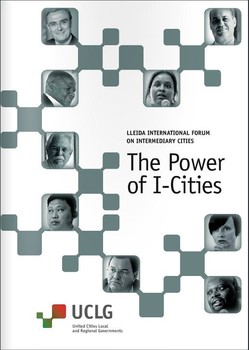
In the framework of the UCLG World Congress held in Rabat, the UCLG Committee on Urban Strategic Planning organized a round table in Rabat on “Planning and Financing Intermediary Cities: Challenges & Opportunities” to address the needs, opportunities and demands of local governments and define a common agenda for the next years.
This parallel session , organized in partnership with FMDV, brought together mayors and representatives of intermediary cities from different countries, presenting various sizes and diversified issues: the mayor of Chefchaouen (Morocco, 35 000 inhabitants); the mayor of Valladolid (Spain, 310 000 inhabitants), the mayor of Inhambane (Mozambique, 77 000 inhabitants), the mayor of Nilüfer (Turkey, 325 000 inhabitants), the mayor of Vitória (Brazil, 350 000 inhabitants), and a representative of Ciudad Bolivar (Venezuela, 370 000 inhabitants). The Intermediary cities network represented by Firdaous Oussidhom delivered a key note who insisted in the necessary empowerment of Intermediary cities in their planning processes. She gave an insight on the Frame- Document that has been prepared during 2013 in collaboration with many experts and cities.
The participants shared the experience of their city, regarding planning instruments used by local governments to face urbanization growth and financial tools that enable the city to offer continuous basic services to their city-dwellers; always from the specific perspective of intermediary cities.
The round table highllited the experiences of the Community Development Plan of Chefchaouen; the local tax system of Valladolid; the public private partnership of Ciudad Bolivar to enhance fiscal recovery by building capacity of the public administration; the decentralized cooperation between Vitoria and Mozambique cities; the challenges encountered by Inhambane; and the policies implemented in Nilufer to face population growth. From a financial point of view, it was interesting to see the different perspectives of I cities regarding taxes: while Inhambane is only starting to introduce tax system and national performance monitoring and emphazises on this issue, the mayor of Valladolid reported no tax increase over the last decade as the city needs to be attractive for investors and compete with other cities.
The session concluded in the following recommendations on strategic planning:
Given the challenges which are beginning to emulate those in metro areas and the lack of skills and capacity, strategic planning must incorporate:
- Accurate information on population and other vital issues to ensure better decision making, and being able to raise revenue.
- Innovation is important because intermediary cities do not have access to large sums of funding like metro areas
- Community involvement in planning is important and lead to increasing opportunities for workers and employees to participate, especially on economic issues and job creation.
- Strategic emphasis should focus on a limited number of issues e.g. tourism, education or agribusiness
Recommendations on financing:
- Need to be creative/innovate in tapping different sources of funding in order to avoid being heavily reliant on national government for funding.
- Entering into partnerships to increase income collection and income generation is useful in intermediary cities as they often do not have the capacity or skill levels to increase revenues.
For more information read the document prepared by the Committee: “The Power of I-cities” and join the online Yammer platform for live updates on the subject.
The session was also part of the Resolutions to Fund Cities program, led jointly by FMDV, UCLG and Metropolis.










